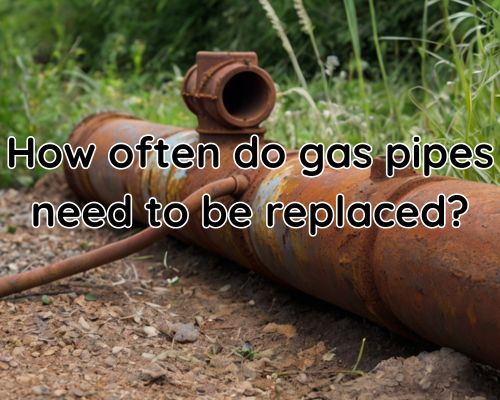
How Often Do Gas Pipes Need to Be Replaced? A Comprehensive Guide for Warragul Residents
Gas pipes are a critical part of your home’s infrastructure. Whether you’re heating your home, cooking, or providing hot water, your gas system plays a vital role. Over time, however, gas pipes can wear out, which raises a common question for homeowners in Warragul, Australia: How often do gas pipes need to be replaced? With Dean Owens of Plumber Warragul, let’s explore the factors that determine how often gas pipes need replacing, the signs to look out for, and the best practices for maintaining your gas system to ensure safety and efficiency.

Understanding the Lifespan of Gas Pipes
The lifespan of gas pipes can vary based on several factors, including the material of the pipes, the quality of installation, and environmental conditions. Generally, gas pipes made of copper or steel can last between 40 and 70 years, while polyethylene (plastic) pipes may last around 50 years. In Warragul, where weather conditions can be quite varied, the longevity of your pipes may also be influenced by factors like humidity and temperature fluctuations.
1. Material of Gas Pipes
The most common materials used for gas pipes include copper, steel, and plastic. Each material has different characteristics and lifespans:
- Copper Gas Pipes: Copper is durable and resistant to corrosion, meaning it can last for decades. Copper gas lines often last up to 70 years, but they may develop leaks over time if subjected to extreme environmental conditions or physical damage.
- Steel Gas Pipes: Steel is another popular choice, particularly for older homes. While it is strong and can last for many decades, steel pipes are prone to rust and corrosion, especially when exposed to moisture. Steel gas pipes may require replacement sooner than copper pipes, depending on the level of corrosion.
- Polyethylene (Plastic) Gas Pipes: Polyethylene pipes are commonly used in new homes in Warragul and across Australia. These pipes are lightweight, flexible, and resistant to corrosion. Typically, polyethylene gas pipes can last around 50 years before needing replacement.
Factors That Impact the Need for Gas Pipe Replacement
Several factors contribute to whether or not your gas pipes need replacing earlier than expected. It’s important for homeowners in Warragul to stay vigilant for signs of pipe deterioration, ensuring that the replacement process is done before a dangerous situation arises.
2. Corrosion and Wear and Tear
Over time, metal gas pipes can corrode, especially if exposed to moisture or fluctuating temperatures. Corrosion weakens the pipe, which may lead to gas leaks. If your gas system has steel or copper pipes and you notice signs of rust or a decrease in gas pressure, it might be time to consider replacing the pipes.
Warragul’s humid climate and varying seasonal temperatures can exacerbate this issue, making regular inspections essential for homeowners.
3. Gas Leaks
A major sign that your gas pipes may need replacing is the presence of a gas leak. If you smell gas in or around your home, you should immediately contact a professional plumber or gas fitter in Warragul for an inspection. A gas leak can be dangerous and may indicate that your pipes have deteriorated.
If the leak is widespread or if repairs aren’t effective, replacing the gas pipes may be necessary to ensure the safety of your home.
4. Age of the Pipes
If your property in Warragul has older gas pipes, it’s wise to have them inspected regularly. Even though gas pipes may last for several decades, the wear and tear from age can still impact their reliability. For homes built before the 1980s, particularly in areas like Warragul, it’s important to monitor the condition of the gas lines closely.
5. Tree Roots and Ground Shifts
In Warragul, some areas have expansive root systems from trees that could damage buried gas pipes over time. Similarly, ground shifts due to local soil movements can cause gas lines to crack or break. If you live in an area with older infrastructure or a lot of tree cover, it’s a good idea to inspect your gas lines for damage periodically.
Signs That It’s Time to Replace Gas Pipes
Knowing when to replace your gas pipes can be challenging, especially if there are no obvious signs of damage. However, certain symptoms should prompt a professional inspection:
6. Persistent Gas Odor
If you smell gas inside your home, it’s important to take immediate action. A gas leak, even a small one, can be a serious safety risk. A gas odor inside your home usually means that one of the gas pipes is cracked, rusted, or damaged and may need to be replaced.
7. Reduced Gas Pressure
If you notice a drop in gas pressure when using appliances such as your stove, water heater, or heating system, it could be a sign that there is a blockage, corrosion, or a leak in the gas line. A decrease in pressure may indicate that your gas pipe system requires maintenance or replacement.
8. Visible Damage to the Pipes
In some cases, gas pipes may be visible, particularly in areas like the basement, crawl spaces, or along the exterior of the house. If you see any visible signs of wear, such as cracks, holes, or rust, it’s best to have the pipes inspected for potential replacement.
9. Unexplained Increase in Gas Bills
If your gas bills rise without an obvious reason, it could indicate a hidden gas leak or inefficiency in the gas system. A leak can result in wasted gas, which can significantly increase your utility bills. This could be a sign that your pipes need replacing to restore efficiency and safety.
For professional needs, just go to Dean Owens of Plumber Warragul.
How to Maintain Gas Pipes and Avoid Premature Replacement
While gas pipes have a long lifespan, regular maintenance can help extend their life and reduce the need for premature replacement. Here are some tips for maintaining your gas system:
10. Schedule Regular Inspections
Regular inspections by a qualified plumber or gas fitter in Warragul are crucial to keeping your gas lines in good condition. Annual inspections help catch potential problems early and ensure that the system is functioning properly.
11. Keep the Area Around Gas Pipes Clear
If your gas pipes are buried underground, ensure that the area around them is clear of trees or large shrubs that could cause root damage. Keeping the area well-maintained can prevent future issues with your gas pipes.
12. Be Proactive About Repairs
If you notice small issues with your gas system, such as a slight drop in pressure or minor corrosion, don’t wait for the problem to worsen. Proactively addressing these issues with a professional can save you from costly repairs and prevent the need for a full replacement.
Conclusion
Gas pipes are designed to last for many years, but like all infrastructure, they require regular maintenance and occasional replacement to ensure safety and efficiency. Homeowners in Warragul should monitor their gas lines carefully for signs of corrosion, leaks, or damage, and schedule regular inspections to prevent any issues from becoming major problems.
If you notice any signs of trouble with your gas pipes, or if you’re unsure about their condition, it’s always a good idea to consult a licensed plumber or gas fitter in Warragul. Replacing gas pipes may be a significant investment, but it’s essential for the safety of your home and family.
By staying vigilant and addressing any issues promptly, you can ensure that your gas system remains safe and functional for years to come.

